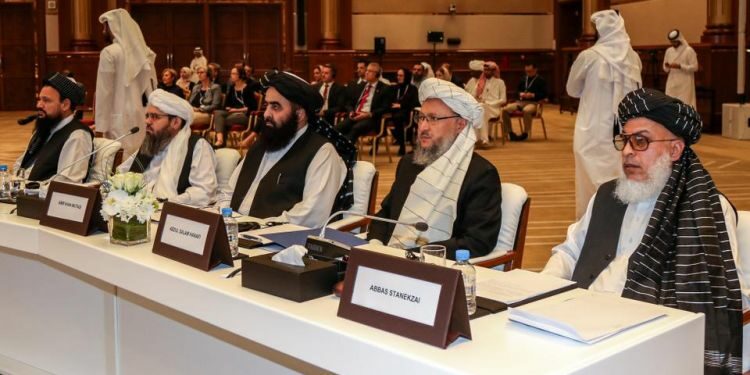In News
- Pakistan welcomed the commencement of the second round of intra-Afghan negotiations in Doha on “substantive issues”, following last month’s agreement between Afghan government and Taliban representatives on the rules and procedures.
What is Doha Intra-Afghan Dialogue
- The U.S. signed a deal (at Qatar’s capital-Doha) with the Taliban that could pave the way towards a full withdrawal of foreign soldiers from Afghanistan over the next 14 months and represent a step towards ending the 18-year-war in Afghanistan known as Doha Intra-Afghan Dialogue.
- Doha Negotiations
- 1st Segment: The Doha track was first initiated with the Taliban.
- 2nd Segment : A second track was with Islamabad/Rawalpindi to cajole the Pakistan Army to lean on the Taliban to get them to the negotiating table.
- 3rd Segment : It was with Kabul to ensure that the Afghan government would accept the Doha outcome.
Background
- On 11 September 2001, terrorist attacks in America killed nearly 3,000 people. Osama Bin Laden, the head of Islamist terror group al-Qaeda, was quickly identified as the man responsible.
- The Taliban, radical Islamists who ran Afghanistan at that time, protected Bin Laden, refused to hand him over. So, a month after 9/11, the US launched airstrikes against Afghanistan.
- The US was joined by an international coalition and the Taliban were quickly removed from power. However, they turned into an insurgent force and continued deadly attacks, destabilising subsequent Afghan governments.
- Since then, the US is fighting a war against the Taliban.
- Donald Trump’s 2017 policy on Afghanistan, was based on breaking the military stalemate in Afghanistan by authorising an additional 5,000 soldiers, giving US forces a freer hand to go after the Taliban, putting Pakistan on notice, and strengthening Afghan capabilities.
- However, the US realised that the Taliban insurgency could not be defeated as long as it enjoyed safe havens and secure sanctuaries in Pakistan, the US changed track and sought Pakistan’s help to get the Taliban to the negotiating table.
- The negotiations began in September 2018 with the appointment of Ambassador Zalmay Khalilzad to initiate direct talks with the Taliban. After nine rounds of US-Taliban talks in Qatar, the two sides seemed close to an agreement.
Challenges Ahead
- Haqqani Network : The leader of the Haqqani Network, Sirajuddin Haqqani happens to be on the U.S. wanted list with a reward of $10 million for information leading to his capture or death.
- Setting Down Nation : U.S. considers the Taliban a partner in counter-terrorism operations against the IS and other terrorist groups.
- Demographic Needs : The current reality is that 74% of Afghan population is below 30 and has lived, for most part, in a conservative but open society.
- Softs Targets: Senior members of the Afghan government continue to be targeted including Vice President .
Evolving Indian stand in the peace process
- India’s vision of a sovereign, united, stable, plural and democratic Afghanistan is one that is shared by a large constituency in Afghanistan, cutting across ethnic and provincial lines.
- At the Doha meeting, India’s External Affairs Ministerreiterated that the peace process must be “Afghan led, Afghan owned and Afghan controlled”.
- But Indian policy has evolved from its earlier hands-off approach to the Taliban.
- U.S. and Russian representatives suggested if India had concerns regarding anti-India activities of terrorist groups, it must engage directly with the Taliban.
History of India-Taliban Relations
- India and the Taliban share a bitter history.
- IC-814 hijack in 1999 (India’s passenger plane was hijacked and taken to Kandahar in Afghanistan- under the control of Taliban) made India to release terrorists — including Maulana Masood Azhar who founded Jaish-e-Mohammed that went on to carry out terror attacks on Parliament (2001), in Pathankot (2016) and in Pulwama (2019).
- Also, the Taliban perceived India as a hostile country, as India had supported the anti-Taliban force after the 9/11 attacks.
- India never gave diplomatic and official recognition to the Taliban when it was in power during 1996-2001.
- However, as the Taliban’s role in Afgan peace process becomes inevitable, India started to make some strides towards the Taliban.
- Earlier, India was part of the Moscow-led talks with the Taliban in November 2018, which two former Indian diplomats attended as “non-official representatives”.
- India is now moving to diplomatically engage with the Taliban. India’s presence at the agreement-signing ceremony is the first sign of a possible diplomatic opening.
















